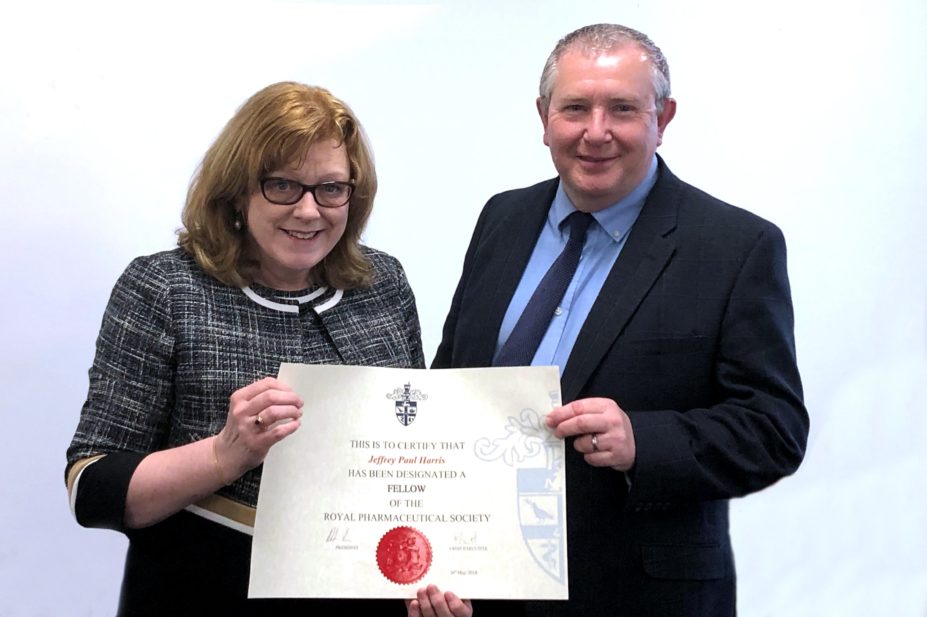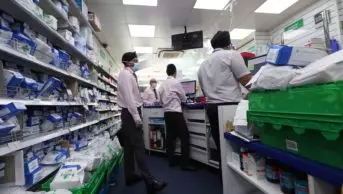
Corrinne Burns / The Pharmaceutical Journal
The Royal Pharmaceutical Society (RPS) Welsh Pharmacy Board (WPB) held its first meeting of 2020 in the Society’s offices at Pontprennau, Cardiff, on 5 February 2020.
Present at the meeting were Paul Bennett and Sandra Gidley, chief executive and president of the RPS, respectively; Ross Gregory, RPS Wales head of external relations; and Jonathan Lloyd Jones, head of external relations at RPS Wales. Robbie Turner, RPS director of pharmacy and member experience, joined the meeting by Skype, as did Gino Martini, RPS chief scientist; Aileen Bryson, RPS Scotland policy and practice lead and deputy director; and Gail Fleming, RPS director for education and professional development.
Opening the meeting, Suzanne Scott-Thomas, chair of the WPB, welcomed Elen Jones to her first board meeting as director for Wales.
Director’s report
In her first director’s update, Jones welcomed Jonathan Lloyd Jones to his new role as policy and engagement lead at the RPS, adding that the former community pharmacy manager brings a “wealth of experience”. Jones also said that Karen Hodson, programme director for Cardiff University’s MSc courses in clinical pharmacy and non-medical prescribing — who had led on policy matters during Jones’ maternity leave — would continue working one day per week with the Society. Jones said she hoped the new team would “energise pharmacists about being part of the RPS”, and help members “get that sense of belonging, and networking opportunities, that they don’t get anywhere else”.
Meetings had recently been held with Margaret Allen, pharmacy dean for Healthcare Education and Improvement Wales; Liam Anstey, General Pharmaceutical Council director for Wales; and Mark Gumbleton and Andrew Morris, heads of the pharmacy schools at Cardiff University and Swansea University, respectively. Jones said she was keen to give universities “a lot more support from the office” and to “widen students’ horizons about options in pharmacy”, as well as “support more pharmaceutical scientist members of RPS”.
Jones and Lloyd Jones, along with some of the WPB members, had attended an implementation meeting for ‘Pharmacy: Delivering a Healthier Wales’ — the vision for how Welsh pharmacy services will look by 2030. The Welsh government has, she said, agreed to a delivery board which is likely to be made up of seven pharmacy practitioners. Jones and Scott-Thomas had also attended meetings of the Welsh Pharmacy Partnership, which of late has been “very focused on the vision”. It was agreed that the partnership “will continue to share ideas and get one voice in pharmacy in Wales”.
Chair’s update
Scott-Thomas said that since the last meeting, she had attended several meetings of the Welsh government advisory board for Brexit. Although no further meetings were scheduled, it had, she said, been useful to have the RPS at the table: “we were respected and listened to”.
A positive meeting had been held with representatives of the Royal College of General Practitioners (RCGPs), at which medicines shortages had been “a hot topic”. The RPS was, Scott-Thomas said, developing some principles around the professional implications of managing shortages.
Welsh Assembly manifesto update
Gregory announced that, ahead of the Welsh government elections in May 2021, RPS Wales had reconvened its public affairs working group: which will agree calls to action. Once these calls have been finalised, the Society will seek to meet officials responsible for developing party manifestos. The main asks are likely to focus on population-based health and wellbeing, quality of care, value for money and the wellbeing of the healthcare workforce.
The Society will publish its call to action in March 2020, and will meet with representatives of parties in March and April 2020.
Sandra Gidley said that while the Society has to lobby for the profession, it is essential to show politicians where the benefit to members of public is — “that will be the clincher”.
Scott-Thomas asked whether the RPS needs to emphasise that “when services are commissioned, there has to be appropriate resource to underpin them”.
Paul Bennett added that although the Society is apolitical, “we are a professional organisation that leads on behalf of the profession: we are entitled to be bold”.
Resource for multidisciplinary teams
Gregory said that a resource on the cultural and behavioural values expected of multidisciplinary teams in general practice, prepared jointly with the RCGP, would be launched at the Welsh Assembly on 12 February 2020. The resource will be hosted on the RPS website. Part of the next steps with this resource, Gregory said, is to “engage key stakeholders and get traction in the NHS”.
Science and research
Gino Martini said that meetings were being held with Action on Smoking and Health England and Wales, ahead of the Society’s publication of its updated policy on e-cigarettes. The science and research team had also “spoken at length” with the Medicines and Healthcare products Regulatory Agency on the issue, especially around the safety of e-liquid additives. “There is an assumption that additives intended for oral use are OK to inhale: scientifically, that’s a big assumption,” Martini said.
National pharmacy board elections
It was noted that four current board members are due to step down on 23 June 2020 and, consequently, four places will be up for election during the 2020 national pharmacy board elections. Scott-Thomas asked the board to encourage members to stand for election and to vote for candidates.
At the end of the meeting, board member Paul Harris was presented with his certificate of RPS Fellowship by Sandra Gidley.
- The date of the next Welsh Pharmacy Board meeting is 29 April 2020.
You may also be interested in

RPS meets with government to discuss pharmacists amending prescriptions during medicines shortages

A third of pharmacists report COVID-19 significantly impacted their mental health and wellbeing
